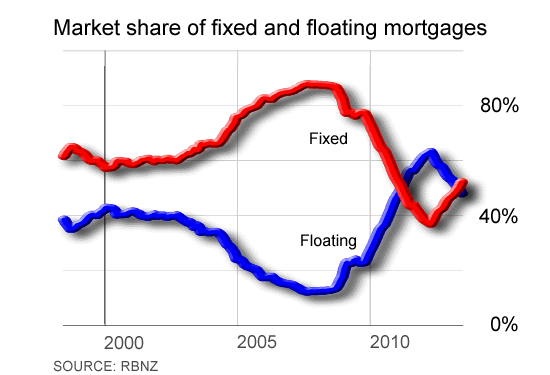
The growth rate of borrowing by Kiwis slowed slightly in the past month, though the annual rate of growth in household lending is at its highest level since October 2008.
However, the charge by borrowers to fixed rate mortgages is continuing unabated. Of the total amount outstanding on New Zealand mortgages, 52.2% is now on fixed, versus 47.8% on floating.
Just two months ago, the amount on floating was at 50.6%, to 49.4% fixed.
The amount on fixed has surged from 50.6% in May to 52.2% in June, in dollar terms that's about NZ$3.4 billion in the month, which is the highest monthly increase since the RBNZ began keeping such records in January 2005.
Total household claims in June - mainly comprising of home mortgages - rose to NZ$196.607 billion from NZ$195.828 billion in May.
The latest figure shows a seasonally adjusted gain of 0.4% - which is down from the 0.5% growth rate in the previous three months. On an annualised basis the new figure is 5.1% higher than the figure at the same time a year ago.
The latest figures may come as some comfort to the Reserve Bank, which has been concerned about a potential build up of household credit, the impact that could have on inflation, and the pressures that might put on the stability of the financial system.

The RBNZ has been strongly indicating that it might move to put "speed limits" on high loan to value (LVR) lending on houses in order to preserve financial stability and also in an attempt to dampen the rising house market.
Economists have doubts as to whether LVR limits will do much to dampen the housing market, with most feeling the RBNZ's best way of doing that will be from increasing official interest rates. Most are expecting the first rise from the RBNZ of the Official Cash Rate to occur in the first half of next year.
A move by homeowners to fixed mortgages from floating will have the effect of slowing the impact of rising interest rates, since they won't be affected till the fixed term on their mortgages expire. However, the vast majority of people currently fixing are not doing so for any longer than about a year.
Elsewhere, the pace of agricultural lending is showing a marked slow down from late last year and earlier this year as the drought bit. The total outstanding in agricultural loans stood at NZ$50.742 billion in June down from NZ$50.763 billion in May, while the annual growth rate in the lending slipped to 4.4% from 5.4% as at May.
Business lending continues to be quite volatile, notwithstanding business confidence being at high levels. The amount outstanding to businesses dropped to NZ$79.586 billion in June from NZ$79.724 billion in May, while the annual rate of growth in the lending stayed steady on 1.6%
No chart with that title exists.
8 Comments
Any way you can get the figure for fixed 3 years and over, as that would truely indicate how much impact an interest rate hike is being insulated against by rushing to fix.
If the money is just chasing 1 year specials, then I wouldn't call it a rush to fix, more a short term sugar hit the banks are offering to lock you in as they expect the rates to rise significantly within a year and they don't want you to fix long term.
Could you please explain further your comment "the banks are offering to lock you in as they expect the rates to rise significantly within a year and they don't want you to fix long term".
I'm not understanding the link you're drawing between rising rates and banks not wanting customers to fix long term - as I'm sure you understand that the absolute level of interest rates has nothing to do with margins banks earn on fixed rate lending.
While I agree that LVR limits will have little impact on slowing the housing market, I'm wondering what impact it will have on the level of borrowing. My thinking is that LVR caps just change the mix of buyers - those who borrow heaps are out - those with deeper pockets are in.
If this is the case, what does this mean for overall debt growth - a huge slow down? And if that's the case, what are the implications for banks deposit rasing activities?
The housing markets in NZ are very strong and i believe there is very strong interest in this market and it will continue in to the long term, NZ is very attractive for international investors, and the issue about LVR will not change the buying of NZ properties at all i think. Rates also are not much of a issue for investors are they are taking a longer term outlook.
this is just my view point !!
A written falsification indicator is a programming requisition intended to make sure that a composed work being distributed on the web is unique and has not been replicated from an alternate composed article as of recently accessible on the web. In spite of the fact that a plagiarism checker free is not dependably essential there are times when this is the best way to figure out doubtlessly if something will be acknowledged as your own particular chip away at the web.


We welcome your comments below. If you are not already registered, please register to comment.
Remember we welcome robust, respectful and insightful debate. We don't welcome abusive or defamatory comments and will de-register those repeatedly making such comments. Our current comment policy is here.